|
|
LIBRARY |
|
|
NOTICE: The Indulux Doman is expiring soon... Since we have suspended operations
due to the Covid19 pandemic, we will not be re-opening. Thanks for your
interest and support
InduLux
Technologies offers you a selection of papers on Magnetic Induction Lighting
technology, also called Induction Lamps or Induction Lights, is currently
one of the longest lifespan types of lighting available!
While this
technology has been surpassed in energy efficiency by LED lighting, there are
still applications where Induction lighting is useful.
The papers in our
library provide information and education on various aspects of Induction
Lights.
|
| |
|
Custom Publication Example |
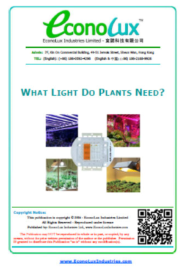 |
What Light Do Plants Need?
This is an example of a paper we were commissioned
to produce for EconoLux Industries, about plant/grow lighting and the spectrum needs
of plants grown under artificial lighting.
Agricultural (or Horticultural) lighting (grow
lights), are widely used in greenhouses, or indoor controlled environments such
is 'vertical farms' with
no natural daylight; to either replace, or augment, natural sunlight (daylight)
in the growing of many different types of crops. These crops can include,
peppers, tomatoes, leafy greens, herbs, flowers or medicinal plants.
In many cases, the most popular type of lights used are HID (Metal Halide
or High Pressure Sodium) lamps. These lamps are generally deficient in spectrum
of the light delivered to the plants, and the electrical energy needed to
operate the plant/grow-lights is a significant amount of the input cost involved
in the production of the crops (compared to properly designed LED grow-lights).
This paper discusses the various curves used to quantify the light spectrum,
especially the McCree curve, that
is most desirable for plant cultivation.
What Light Do Plants Need? (EconoLux Publication)
(Click link to read on-line; Right
click and choose "Save Link As" to download a copy)
|
|
NOTE: These papers and
publications can be customized with your logo and
contact information to provide educational and informational materials
for your customers and staff - see our
Products
page or please Contact Us to get
details.
If you wish to use these materials "as is" you are free to do so, provided
that source identification remains intact (the files are not edited or changed in any
way), and the copyright notice remains intact. |
|
The Science Behind Magnetic Induction Lighting - By: Michael Roberts |
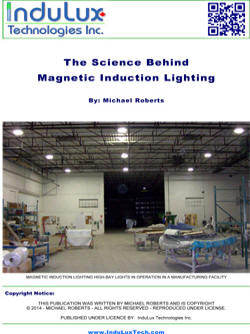 |
The Science Behind Magnetic Induction Lighting
This 28 page paper (PDF) gives a comprehensive overview of Magnetic Induction Lighting, how it
works, a discussion of human vision, detailed information on S/P ratios and
Visually Effective Lumens (VEL), the psychological effects of light, etc.
There are numerous citations and quotes from
scientific papers which show that current lighting measurements do not
accurately reflect the needs of human vision and how Induction Lamps (and
LED lights) can
fulfill those needs in an energy efficient manner. A brief overview of
environmental issues shows that Induction lighting is a green lighting
technology which can help reduce CO2
emissions thereby helping to reduce global warming.
The paper includes many graphs, charts and photographs
to give the reader added insight into Magnetic Induction Lighting
technology.
References are included for those who wish to follow up on the original
papers cited in this publication.
The Science Behind Magnetic Induction Lighting
(Click link to read on-line; Right
click and choose "Save Link As" to download a copy) |
|
|
|
How Magnetic Induction Lamps Work - By: Michael Roberts |
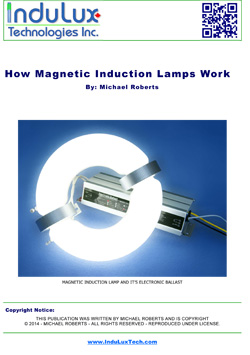 |
How Magnetic Induction Lamps Work
This 8 page paper (PDF) provides an introduction to Induction Lamps with a brief overview of a
history of lighting, and a section detailing how some common conventional lamps work.
Extensive information, with diagrams, on how both external inductor and
internal magnetic induction lamps operate is provided, so that the reader will become
familiar with the inner working of induction lamps.
There are some example induction lamp applications, and a summary
section providing the advantages of induction lamps. Graphs, charts and
photographs give the reader added insight into the technology.
How Magnetic Induction Lamps Work
(Click link to read on-line; Right click
and choose "Save Link As" to download a copy) |
|
|
|
Induction Lighting - Frequently asked Questions (FAQ) |
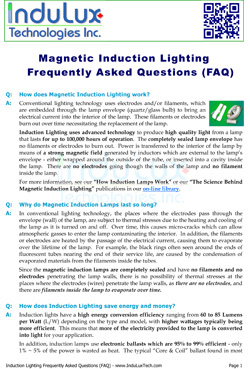 |
Induction Lighting - Frequently asked Questions (FAQ)
How does Magnetic Induction
Lighting work? Why do Magnetic Induction Lamps last so long? How
does Induction Lighting save energy and money? Is Induction Lighting
environmental friendly? What are the main types of Induction
Lamps? Are dedicated fixtures required for Induction Lamps? Are
Induction Lamp fixtures affected by temperature? Where can Induction
Lights be used?
The answers to these, and
may other questions about Induction Lighting are here in the PDF version of
our FAQ.
Induction Lighting - Frequently Asked Questions (FAQ)
(Click link to read on-line; Right
click and choose "Save Link As" to download a copy) |
|
|
|
Environmental Aspects Of Magnetic Induction Lamps - By: Michael Roberts |
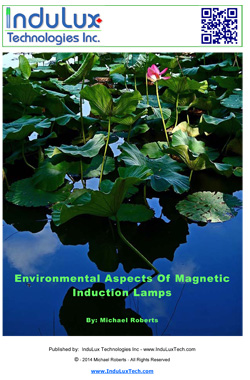 |
Environmental Aspects of Magnetic Induction Lamps
In an time when there
is growing concern about Global Warming and Climate Change, and a desire to
reduce our environmental footprint, individuals and business are seeking
ways to reduce their environmental impact - to "Go Green".
This 16 page paper, with many illustrations and tables, considers
energy efficient lighting, particularly Magnetic Induction Lamps, as a way
to implement an environmentally friendly technology. Induction Lamps
are a green lighting technology that can reduce environmental impact in
several areas such as saving energy, reducing CO2
(greenhouse gas) emissions, reducing global warming (climate change),
reducing Mercury consumption, and improving
recycling issues.
Reducing the environmental impact and "carbon footprint" of your
operations may be more feasible and financially viable when implemented as a series of small
incremental steps rather than as a large project. One of the often
overlooked areas, where it is both simple and financially feasible to make
improvements, is in green lighting systems.
Environmental Aspects of Magnetic Induction Lamps
(Click link to read on-line; Right click
and choose "Save Link As" to download a copy)
|
|
|
|
Induction
Lamp Technology Application Guidelines - By: Michael Roberts |
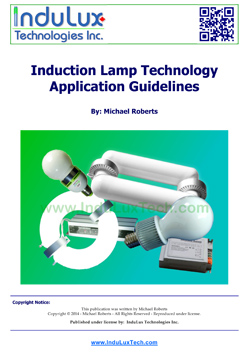 |
Induction Lamp Technology Application Guidelines
In light of many
questions regarding the merits of internal inductor lamps Vs. external inductor
lamps, high frequency and the low frequency ballasts available to drive
them, RFI (Radio Frequency Interference) and various lamp colour temperatures
(Kelvin); it is sometimes confusing to determine which of these is the
right choice for a particular induction lighting application.
This 8 page guide attempts to summarize the pros and cons of each
induction lighting technology, in a simplified manner, so as to provide some
general guidance for selecting the best induction lighting technology for your
application.
Induction Lamp technology Applications Guidelines
(Click link to read on-line; Right
click and choose "Save Link As..." to download a copy)
|
| |
|
|
Induction Lighting Case Studies -
By: InduLux Technologies |
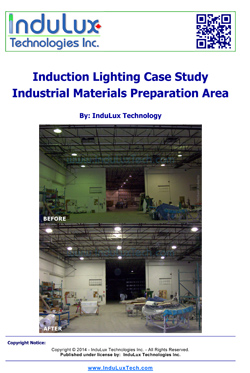 |
Induction Lighting Case Study:
Industrial Materials Preparation Area
A composite
materials and structures fabrication company, is located in an older
industrial warehouse, with high ceilings. The pre-production area,
where materials are measured and cut, was poorly lit by old mercury vapour
(MV) High-bay fixtures.
The 12 inefficient MV High-bay fixtures were replaced with 15
Magnetic Induction Lamp based High-bay fixtures, and the incandescent security
lights were also replaced with low-wattage Induction Lamps.
In summary, electrical load was
reduced from 4,100W to 3,168W - about a 22% energy savings; Average
light levels were improved from 130.3 to 257.5 Lux - about 98% brighter;
and when adjusted for S/P Ratio, the new lighting produced 417.4 VEL - about a
300% increase in VEL!
This 6 page case study provided
diagrams, detailed light measurements and before and after comparisons of
energy consumption and light levels.
Induction
Lighting Case Study: Industrial Materials Preparation Area
(Click link to read on-line; Right click
and choose "Save Link As" to download a copy) |
|
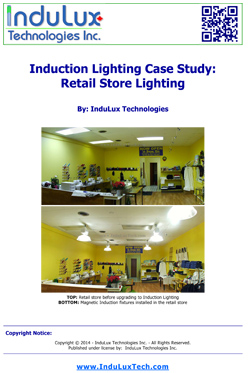 |
Induction Lighting Case Study:
Retail Store Lighting
A small custom embroidered gift store, was
poorly lit with recessed fluorescent troffer fixtures. Staff complained they were
having problems seeing fine needlework and matching colours. The
fluorescent fixtures were disabled and new Magnetic Induction lamp
Low-bay fixtures with prismatic shades were installed. Improved placement
of the induction lamp fixtures eliminated operator shadows at the sewing
machines. Incandescent halogen track-lights were replaced with LED lamps.
In summary, the new magnetic induction fixtures and LED lamps provide
much smoother, glare free lighting, at higher light levels, with improved colour
rendering and significant energy savings. Electrical load was reduced from
1,150 W to 717 W - more than a 37% energy savings; Average light levels
were improved from 365.8 to 595.5 Lux - more than 55% brighter!
This
8 page case study provided diagrams, detailed light measurements and before and
after comparisons of energy consumption and light levels.
Induction Lighting Case Study:
Retail Store Lighting
(Click link to read on-line; Right click
and choose "Save Link As" to download a copy) |
|
|
|
|
Illustrations |
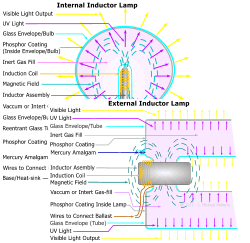 |
Illustrations
Our Internal and External Induction Lamp
Illustrations are popular and used by many people (and even plagiarized by a
few). Unfortunately, some have taken the illustrations from PDF files
or other sources where the quality is degraded. We are now making
these illustrations available, in high resolution JPG versions, for use on
your web site, and in your presentations and publications - subject to the
terms of the license below.
LICENSE:
The illustrations are copyright © 2008~2017 by
InduLux Technologies. You are hereby granted a license to use these illustrations
on web sites, in presentations and in publications PROVIDED that you do NOT alter/edit the images in any
way (except for re-sizing them), and you do NOT change the file names.
Enjoy!
Internal
Inductor Type Lamp Dwg
External Inductor Type Lamp Dwg
(Click link to view on-line; Right click
and choose "Save Link As" to download a copy)
|
|
|
 |
La información
en español
|
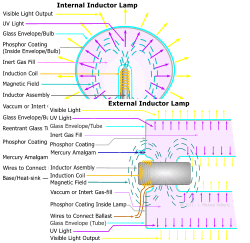 |
Ilustraciones
Nuestra Ilustraciones de
inducción interna y externa de la lámpara son muy populares y son utilizados
por muchas personas. Ahora hemos hecho estos diagramas disponibles en
versiones JPG de alta resolución, para su uso en su sitio web, y en sus
presentaciones y publicaciones - sujeto a los términos de la licencia a
continuación.
LICENCIA: Las ilustraciones
son de derechos de autor © 2008~2018 por Michael Roberts. Presente se le concede una licencia de uso de estas ilustraciones en las
p á ginas web, en presentaciones y en las publicaciones siempre que no
alteren / editar las imágenes
en modo alguno (excepto para cambiar el tamaño a), y no cambiar los
nombres de archivo. Disfrute!
Lámpara de inductor interno diagrama
Lámpara de inductor externo diagrama
(Haga clic en enlace para ver
on-line, haga clic en botón derecho y elige "Guardar enlace como" para descargar
una copia) |
| |
|
InduLux
Technologies
Blyth, Ontario, Canada
HOME
| LIBRARY |
SERVICES |
PRODUCTS |
ABOUT US | CONTACT US
© 2008~2021 InduLux Technologies
and www.induluxtech.com - All rights reserved.
Logos and trademarks are the property of their respective owners - used by
permission.
|